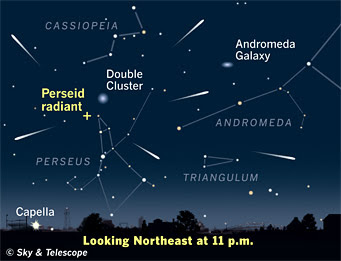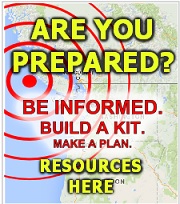 Sky Map. Click to enlarge |
This Summer's Biggest
|
Grab a lawn chair and a blanket -- and watch the show!
The annual August Perseid meteor shower probably ranks as the all-time favorite meteor shower of the year. This major shower takes place during the lazy, hazy days of summer, when many families are on vacation. And what could be more fun than watching this summertime classic? The 2015 Perseid meteor shower will happen from July 13 to August 26, with activity peaking around August 12 and 13.
This year should be an especially good year for Perseids since the new moon on August 14, 2015 will not come out until after sunrise.
No matter where you live, the 2015 Perseid meteor shower will probably be at its best on the nights of August 12-13 when the shower peaks. Try the nights before and after that, too. Before dawn viewing is best. You'll often see 50 to 100 meteors per hour. They radiate from a point in the constellation Perseus the Hero, and are typically fast and bright meteors frequently leaving persistent trails. Each year, the Perseid's combine with the Delta Aquarid meteor shower to produce the year’s most dazzling display of shooting stars! (Tips for best viewing below.)
The source of the Perseid meteor shower is actually debris from the comet Swift-Tuttle. Every year, the earth passes through the debris cloud left by the comet
Download your free August 2015 Evening Sky Map here.
If you plan to stay up and watch the awesome spectacle here's a few tips:
- The darker the better. Although visible everywhere, away from city lights the shower is best.
- If you don't see any meteors at first, be patient. This is a meteor shower, not a meteor storm. There will be a lot more meteors than you would see on a normal night, but they will still only come at random intervals, perhaps 20 or 30 in an hour.
- When you do see a meteor, it will likely be very fast and at the edge of your field of vision. You may even doubt that what you saw was real. But, when you do see something, watch that area more closely, as two or three meteors often come in groups,
Enjoy the show!
















